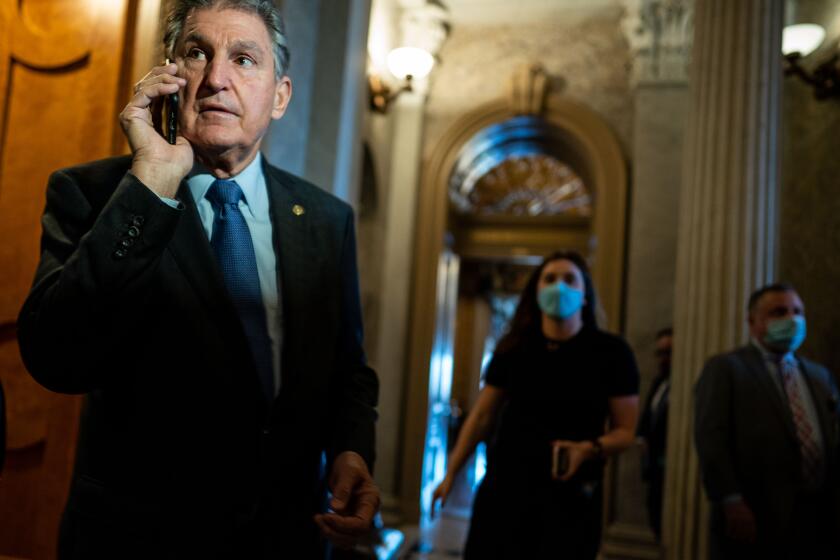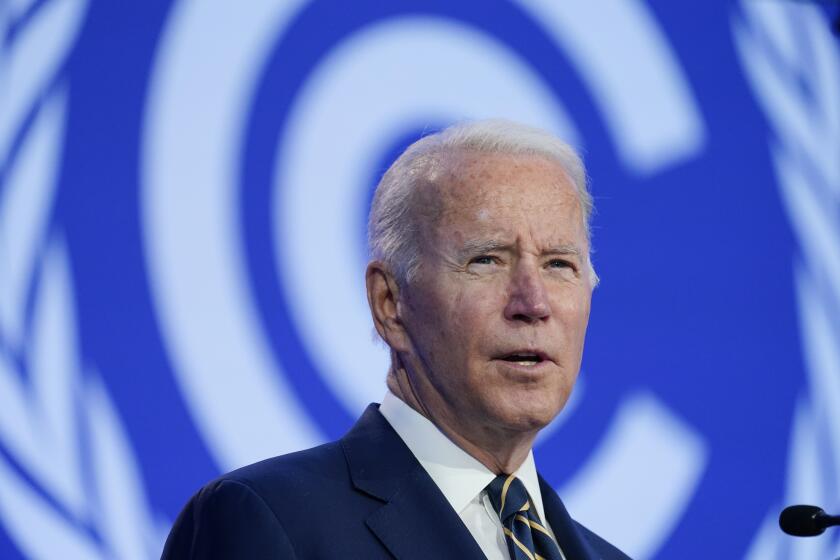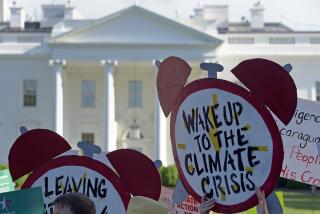News Analysis: Did Manchin just torpedo Biden’s effort to combat climate change? Democrats vow to fight on

By announcing he would not vote in favor of President Biden’s social spending bill, Democratic Sen. Joe Manchin all but delivered a death blow to the $2-trillion domestic initiative. Manchin’s decision also jeopardizes his party’s agenda, infuriating the White House and angering many colleagues.
Democratic Sen. Joe Manchin III’s announcement Sunday that he opposed President Biden’s massive spending package may be much more than a political setback for the White House.
In torpedoing a bill that included $555 billion to combat climate change, the longtime West Virginia senator is, at least for now, singlehandedly preventing the U.S. from being able to reach Biden’s emissions reductions targets — and undermining the president’s credibility in persuading other countries to take steps to stave off a catastrophic future of extreme heat, drought, fires, storms and floods.
“The climate crisis isn’t going away, and the devastating damages from heating the planet are being increasingly felt in communities across the country,” said Nat Keohane, president of the Center for Climate and Energy Solutions. “Not investing in climate and clean energy infrastructure would be a setback for American credibility and global leadership on climate — but just as importantly, it would be a setback for the global competitiveness of American manufacturers, for the health of the U.S. economy and for clean energy jobs.”
A broad array of Democratic lawmakers and environmental activists responded to Manchin’s shift with an unusual degree of unanimity, rallying around the need to act if not aligning fully on the strategy. They pledged to press ahead, in recognition that failing to deliver on the climate provisions, which were a central element of Biden’s presidential campaign, could spark an existential crisis for the planet and their party.
“We are undeterred,” said Pete Maysmith, senior vice president of campaigns for the League of Conservation Voters. “There is still an overwhelmingly strong political and scientific and policy imperative to get this done — whether it’s for the economy, clean energy jobs, cutting costs with people’s energy bills and saving the planet. So we are going to fight as hard as we ever have to pass Build Back Better.”
Majority Leader Charles E. Schumer (D-N.Y.) told Senate Democrats in a letter Monday that he plans to bring “a revised version” of the House bill to the floor for a vote in January “so that every Member of this body has the opportunity to make their position known on the Senate floor, not just on television.”
He added: “We will keep voting on it until we get something done.”
House Speaker Nancy Pelosi (D-San Francisco) echoed that determination, saying that she’s confident “Manchin cares about our country and at some point, very soon, we can take up the legislation.”
But Rep. Pramila Jayapal (D-Wash.), the leader of the House’s progressive caucus, blasted Manchin’s “lack of integrity” and urged Biden to move on and enact his climate agenda through executive action.
“The administrative path cannot wait until the legislative path is done,” she said. “We need to start acting immediately. And the president needs to start acting immediately.”
But experts believe executive action on its own won’t be enough to meet the goal Biden laid out in April of slashing U.S. emissions between 50% and 52% below 2005 levels by 2030.
Last month at a major climate summit in Scotland, he urged other countries to act in the coming decade and touted the climate components of his $1.75-trillion spending plan as “the most significant investment to deal with the climate crisis that any advanced nation has made ever.”
John Larsen, who analyzes energy policy at the Rhodium Group, a research firm, said that target is achievable if all of Biden’s agenda is enacted.
“But it’s much harder to envision hitting the target without a foundation of clean energy tax credits and other grant programs,” Larsen said.
Biden has already taken executive action to limit emissions. The administration has issued rules to curb toxic pollutants used in refrigeration and air conditioning, and announced Monday that it is tightening mileage standards for cars and light trucks.
However, without the tax credits that were part of the massive spending package and aimed at incentivizing a faster transition to cleaner fuels, energy providers and manufacturers are likely to resist changing course.
“There are other levers in other parts of the federal system,” Larsen said. “But all of those levers are easier to pull when you have hundreds of billions of dollars in federal tax credits to lower the cost of pulling them.”
President Biden’s ‘Build Back Better’ plan appears to be dead after Sen. Joe Manchin says he cannot vote for the package.
Manchin, whose family owns a lucrative coal waste business, had already chipped away at the climate change components in the original package. In hopes of winning Manchin’s vote, Biden had agreed to drop a $150-billion plan to transition coal plants to cleaner fuels, as well as proposals to reduce methane emissions, promote electric cars and halt offshore oil drilling.
The bill, which passed in the House last month, included $320 billion in tax credits for producers of wind, solar and nuclear power, as well as credits for those using renewable power sources.
The bill contained $320 billion in tax credits for producers and buyers of wind, solar and nuclear power.
The centerpiece of President Biden’s climate agenda is running into opposition from key moderate Democrats.
An October analysis from the Rhodium group said existing policies were enough to reduce emissions between 17% and 25% by 2030. Experts said that other federal action, including executive actions taken by Biden and the passage of the provisions in the Build Back Better plan, could achieve a reduction of 45% to 51%.
Larsen noted that the infrastructure legislation includes research funding for clean energy initiatives, but no market incentives.
“None of these technologies are going to take off in a commercial way without a market. That was what Build Back Better was going to provide,” he said.
Failing to pass legislation to address climate change could also send a discouraging signal to the rest of the world, which Biden is attempting to coax along in the fight to slow the planet’s rise in temperature, said David Victor, a professor at the School of Global Policy and Strategy at UC San Diego.
“This is the first unambiguous signal that there’s no realistic plan that delivers the bold promises made by the U.S.,” Victor said. “I was always skeptical that those promises could be honored even with reconciliation. But without it, the task is a lot harder — probably impossible.
Victor said there was a “fragile consensus” after the climate summit in Glasgow where less developed countries believed richer nations were willing to contribute more to fighting global warming.
“Without the U.S. fully in, the diplomatic consensus you need to keep the machinery going starts fraying,” Victor said. “You’re going to see more and more resentment, and concern about the credibility of the overall global effort on climate.”
‘Glasgow must be the kickoff of a decade of ambition and innovation to preserve our shared future,’ the president says.
Manchin, who holds the critical 50th Democratic vote in an evenly divided Senate, appears to see things differently.
In a lengthy statement Sunday explaining his opposition, he reiterated concerns about more government spending (the legislation, the White House noted, would be fully paid for by raising taxes) amid spiking inflation. He also took aim, specifically, at the climate provisions of the legislation, asserting that the proposals “risk the reliability of our electric grid” and that “the energy transition my colleagues seek is already well underway.”
White House Press Secretary Jen Psaki responded with a bruising statement, accusing Manchin of having negotiated in bad faith and blasted his “sudden and inexplicable reversal” on legislation, she said, he’d privately told the president he would support after additional adjustments.
The recriminations continued Monday, as Manchin vented during another interview that he came to his “wit’s end” after White House staffers “put some things out that were inexcusable,” an opaque reference to Biden’s statement last week that cited Manchin’s ongoing opposition as the main obstacle to a vote before the end of the year.
Scientists are seeing changes off Alaska that have never been documented before, as warming upsets a vast ecosystem and one of the world’s vital fisheries.
A range of congressional Democrats, from fiery progressives to avowed moderates, echoed that determination, all asserting the importance of acting urgently on climate change. Scientists, they point out, widely agree that there is little time to waste in taking action to slow the dramatic rise in global temperatures.
And these lawmakers are also keenly aware that their own window to act — Republicans uniformly oppose Build Back Better and nearly all Democrats’ efforts to curb emissions — may be even shorter, with the GOP poised to win control of Congress in the 2022 midterm elections.
“The planet is not going to pause its warming process while we sort our politics out. We owe it to future generations to figure out what can pass, and pass it,” Sen. Brian Schatz (D-Hawaii) said in a statement. “Despair is not an option.”
Energy Secretary Jennifer M. Granholm was succinct in a tweet, stating: “This is not over, folks.”
Times staff writers Jennifer Haberkorn and Nolan D. McCaskill contributed to this report.
More to Read
Get the L.A. Times Politics newsletter
Deeply reported insights into legislation, politics and policy from Sacramento, Washington and beyond. In your inbox three times per week.
You may occasionally receive promotional content from the Los Angeles Times.












